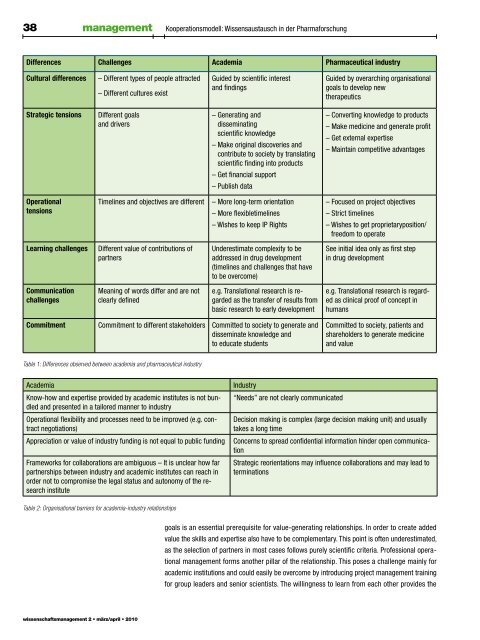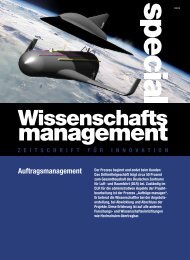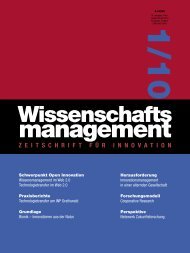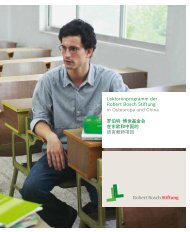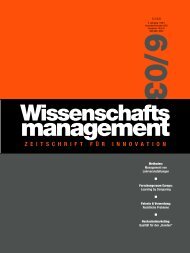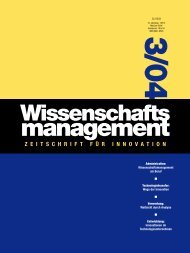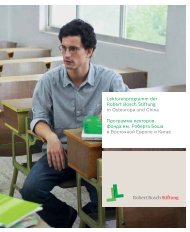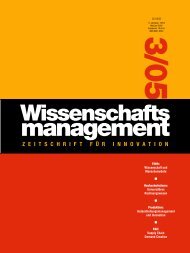Horváth & Partners Wissenschaftskonferenz 2010 Strategien für den
Horváth & Partners Wissenschaftskonferenz 2010 Strategien für den
Horváth & Partners Wissenschaftskonferenz 2010 Strategien für den
Erfolgreiche ePaper selbst erstellen
Machen Sie aus Ihren PDF Publikationen ein blätterbares Flipbook mit unserer einzigartigen Google optimierten e-Paper Software.
38 management Kooperationsmodell: Wissensaustausch in der Pharmaforschung<br />
Differences challenges academia Pharmaceutical industry<br />
cultural differences – Different types of people attracted<br />
– Different cultures exist<br />
strategic tensions Different goals<br />
and drivers<br />
operational<br />
tensions<br />
wissenschaftsmanagement 2 • märz/april • <strong>2010</strong><br />
Guided by scientific interest<br />
and findings<br />
– Generating and<br />
disseminating<br />
scientific knowledge<br />
– Make original discoveries and<br />
contribute to society by translating<br />
scientific finding into products<br />
– Get financial support<br />
– Publish data<br />
Timelines and objectives are different – More long-term orientation<br />
– More flexibletimelines<br />
– Wishes to keep IP Rights<br />
Learning challenges Different value of contributions of<br />
partners<br />
communication<br />
challenges<br />
Meaning of words differ and are not<br />
clearly defined<br />
Underestimate complexity to be<br />
addressed in drug development<br />
(timelines and challenges that have<br />
to be overcome)<br />
e.g. Translational research is regarded<br />
as the transfer of results from<br />
basic research to early development<br />
commitment Commitment to different stakeholders Committed to society to generate and<br />
disseminate knowledge and<br />
to educate stu<strong>den</strong>ts<br />
Table 1: Differences observed between academia and pharmaceutical industry<br />
Table 2: Organisational barriers for academia-industry relationships<br />
Guided by overarching organisational<br />
goals to develop new<br />
therapeutics<br />
– Converting knowledge to products<br />
– Make medicine and generate profit<br />
– Get external expertise<br />
– Maintain competitive advantages<br />
– Focused on project objectives<br />
– Strict timelines<br />
– Wishes to get proprietaryposition/<br />
freedom to operate<br />
See initial idea only as first step<br />
in drug development<br />
e.g. Translational research is regarded<br />
as clinical proof of concept in<br />
humans<br />
Committed to society, patients and<br />
shareholders to generate medicine<br />
and value<br />
Academia Industry<br />
Know-how and expertise provided by academic institutes is not bundled<br />
and presented in a tailored manner to industry<br />
“Needs” are not clearly communicated<br />
operational flexibility and processes need to be improved (e.g. con- Decision making is complex (large decision making unit) and usually<br />
tract negotiations)<br />
takes a long time<br />
Appreciation or value of industry funding is not equal to public funding Concerns to spread confi<strong>den</strong>tial information hinder open communication<br />
Frameworks for collaborations are ambiguous – It is unclear how far Strategic reorientations may influence collaborations and may lead to<br />
partnerships between industry and academic institutes can reach in<br />
order not to compromise the legal status and autonomy of the research<br />
institute<br />
terminations<br />
goals is an essential prerequisite for value-generating relationships. In order to create added<br />
value the skills and expertise also have to be complementary. This point is often underestimated,<br />
as the selection of partners in most cases follows purely scientific criteria. Professional operational<br />
management forms another pillar of the relationship. This poses a challenge mainly for<br />
academic institutions and could easily be overcome by introducing project management training<br />
for group leaders and senior scientists. The willingness to learn from each other provides the


